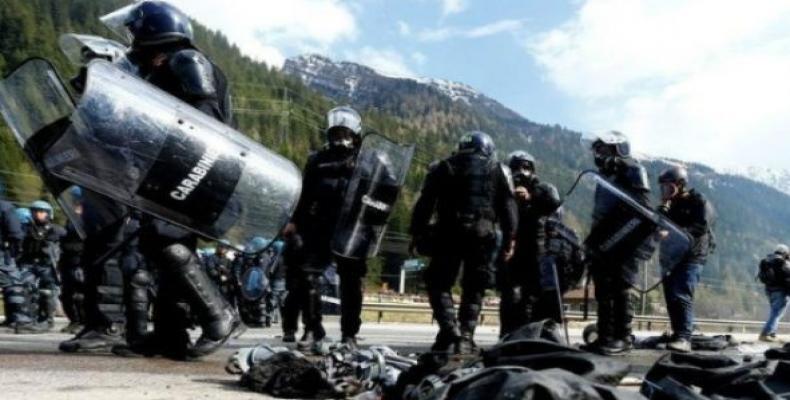Vienna, July 7 (RHC)-- As Brussels calls on Europe to aid Italian authorities in monitoring the influx of immigrants from North Africa, Austria says it will deploy troops to secure its border with Italy.
Hans Peter Doskozil, Austria's defense minister, announced that 750 troops were on standby to support four armored carriers that had been sent to the Tyrol region. The minister told Kronen Zeitung that the troops would be an absolute necessity on the Brenner pass if the immigrants continue to arrive in droves. He added that border controls would also be reintroduced on the Alpine pass.
Franz Kompatscher, the mayor of Brenner, said the town had not yet seen troops, but fears had risen following an upsurge of arrivals in southern Italy, in the run-up to the elections in October. "There isn’t a problem with migrants here, it’s not like it was last year,” Kompatscher said. “Very few come here now because they know it’s very difficult to cross the border. Some do manage to cross, but it’s not easy. "But again, people are also worried because they see that politicians aren’t doing anything to control this situation.”
Austria and Italy are both a part of the European Union (EU’s) border-free Schengen zone, which eliminates passport checks. Several other countries have reintroduced some border controls measures following the arrival of over 1 million refugees and migrants in 2015. A record number of people are expected to cross the Mediterranean sea in 2017, with arrivals already 20 percent higher than that of the same period last year.
Some Italian politicians and the Libyan coast guard have long complained that the NGOs’ presence encourages migrants to risk the perilous journey to Italy. According to data from the International Organization for Migration, 85,183 people have arrived in Italy since January, compared to 71,279 last year.
Frans Timmermans, a European Commission vice-president, said Italy’s call for solidarity was completely justified and implored other EU member states to meet their promises of housing refugees under a relocation scheme.
“It would make a world of difference if member states would just do what they agreed before.” He warned that Brexit did not exempt the UK from taking part in a new refugee relocation scheme, as the Commission announced a plan to bring asylum seekers from Libya, Egypt, Ethiopia and Sudan to Europe.
European countries have taken in 16,500 Syrian asylum seekers from Turkey, but a similar initiative to relocate refugees from camps in Greece and Italy has stalled because some of the countries refuse to take part. The EU executive has also backed plans for a controversial code of conduct to govern non-governmental organizations (NGOs) that rescue migrants at sea.
NGOs have reacted angrily to the code of conduct, because it will likely subject them to the control of Libyan and Italian coast guards, restricting their ability to save passengers from overcrowded and unseaworthy smuggling boats.
Some Italian politicians and the Libyan coast guard have long complained that the NGOs’ presence encourages migrants to risk the perilous journey to Italy.
The EU executive has endorsed the general idea of the code, while calling on the Italian authorities to work with NGOs to draw it up. But United Nations agencies gave the plans a withering response while accusing North Atlantic Treaty Organization (NATO) and commercial shippers of ignoring the duty of rescuing people at sea.
“Quite often we see shipping companies switching off their GPS system … in order not to rescue people. This is also happening on a daily basis in the Mediterranean sea,” said Vincent Cochetel, the head of the United Nations High Commissioner for Refugees' Europe office.
“Can you tell me how many ships operating under NATO Operation Sea Guardian, have been rescuing people at sea from the central Mediterranean over the last two or three years? Has that happened? Can we have a code of conduct for military ships cruising through the central Mediterranean?”
Director of the Europe office of the International Organization for Migration in Europe, Eugenio Ambrosi, said Europe was on “a very slippery slope” with the proposed code of conduct.
“What is the problem with NGOs? I was asking myself the same question. I don’t know … I know that they are saving lives and I know that that is an imperative. “Member states also have a code of conduct – it is called European law, including the duty and obligation to show solidarity in fact and not in words.” He said the EU was too fixated on arrival numbers and was neglecting why people made the journey and the plight of 240,188 internally displaced people in Libya, who are forced to leave their homes.
Migration is one of the most divisive issues for the EU, with countries deadlocked over how to reform the bloc’s asylum rules. Some EU officials argued, specifically, that Italy and Greece have not done enough in the past, pointing to delays in procedures that deal with refugees and migrants.
Austrian Troops to Stop Migrants Crossing Border with Italy

Related Articles
Commentaries
MAKE A COMMENT
All fields requiredMore Views
- Cuban delegation calls on rich countries at ECLAC to fulfill development aid
- New York doctor fired for rejecting Zionist propaganda, defending resistance
- Cubans to take part in Panamerican Junior Judo Cup
- Public health cooperation improves services in Pinar del Río
- Cuban delegation attends World Telecommunications Conference

